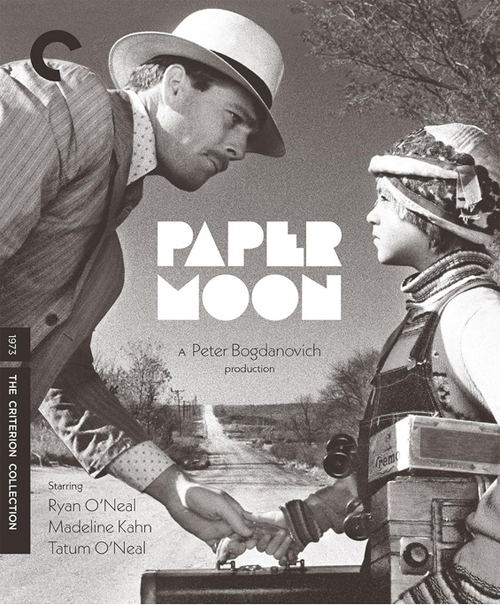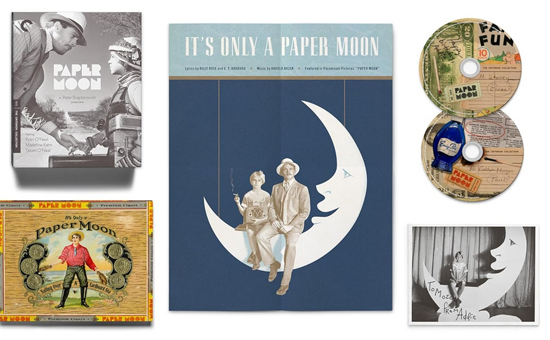
“ADDIE
AND MOZE’S ROAD TRIP”
By
Raymond Benson
This
absolute gem of a film has finally received the Criterion treatment in high
definition. Paper Moon was already a delight, but now it’s even more so.
Based
on the decently-selling 1971 novel Addie Pray by Joe David Brown,
Paramount Pictures had scooped up the rights and had secured John Huston to
direct it with Paul Newman starring with one of his daughters. The project fell
apart and it was offered to Peter Bogdanovich, who was flying high after the
huge successes of The Last Picture Show (1971) and What’s Up, Doc? (1972).
Bogdanovich
read the script written by Alvin Sargent and wasn’t particularly thrilled about
it. His former wife, Polly Platt, with whom he was still friendly and worked with on
previous pictures (she was production designer for three of his recent movies)
read it and convinced him to do it. She even suggested Tatum O’Neal as the
star. After visiting Ryan O’Neal and Tatum at their Malibu home, Bogdanovich
was convinced Tatum could do it, and then went the whole way and asked Ryan to
star as well, making it a true father-daughter one-two punch. After rewrites
with Sargent on the script, the director then knew the movie had to be made.
Set
during the Great Depression of 1930s Kansas, Nebraska, and Missouri, the story
is the tale of an orphaned girl, Addie (Tatum, who was eight and nine when the
picture was made), who meets a dubious con man, Moze (Ryan) at her mother’s
funeral. She suspects that he’s really her “daddy.” One thing leads to another,
and some locals convince Moze to give Addie a ride to her aunt’s house in St.
Joseph. Along the way, Addie witnesses Moze’s attempts at conning strangers out
of their money. Moze even convinces the brother of the man who accidentally
killed Addie’s mother to give her $200. The mistake he then makes is spending
it on a new car. Addie is wise beyond her years, so she extorts him to pay back
the money that is legally hers. Thus begins a road trip movie across the
Midwest, where the reluctant “father and daughter” participate in more con
games, meet a ditzy stripper, Trixie (the fabulous Madeline Kahn) and her
teenage black maid, Imogene (P. J. Johnson), get in trouble with the law, and
other sometimes hilarious, other times touching, vignettes. One of the
overriding questions in the film—Is Moze really Addie’s father?—hangs
over the proceedings, and it’s up to the audience to decide the answer.

Paper
Moon is
easily one of Bogdanovich’s better pictures, the crowning touch of a master
trilogy of titles that began with The Last Picture Show. Upon its
release, the movie was an immediate box office hit. Tatum O’Neal became the
youngest performer ever to win an Oscar—Best Supporting Actress—for her
remarkable work. Madeline Kahn was also nominated for Supporting Actress, the
script was up for Adapted Screenplay, and the movie’s Sound got the nod. Why it
didn’t receive a Best Picture nomination is a mystery, and it’s especially
surprising that Ryan O’Neal did not get a nomination. This reviewer believes Paper
Moon is the actor’s crowning achievement. But, indeed, the movie belongs to
Tatum O’Neal. There are not many child performances in the history of cinema
that can touch hers.
The
Criterion Collection’s new 4K digital restoration, with uncompressed monaural
soundtrack, looks beautiful in László
Kovács’s glorious black and white cinematography.
Criterion has released the film in a 2-disk 4K UHD edition (that also includes
the Blu-ray and supplements) as well as the single disk Blu-ray. The film comes
with the 2003 audio commentary by Bogdanovich, ported over from the Paramount
DVD. The director is always an entertaining spokesman with wonderful stories
about the making of the movie.
Supplements
include a new video essay on the film by Peter Tonguette (Bogdanovich’s
biographer), the 2003 Introduction to the film by Bogdanovich, an archival
interview with Polly Platt, Platt’s home movies of location scouting, a
port-over from 2003 of a three-part “making of” documentary featuring
Bogdanovich, Platt, producer Frank Marshall, and Kovács;
and an absolutely terrific excerpt from The Johnny Carson Show when
Bogdanovich and both O’Neals appeared as guests. The theatrical trailer rounds
up the package. An essay by critic Mark Harris appears in the enclosed booklet.
Paper Moon is for fans of director Bogdanovich, Ryan and
Tatum O’Neal, 1970s “New Hollywood,” Depression-era tales, and poignant comedy.
Highly recommended.
Click here to order from Amazon